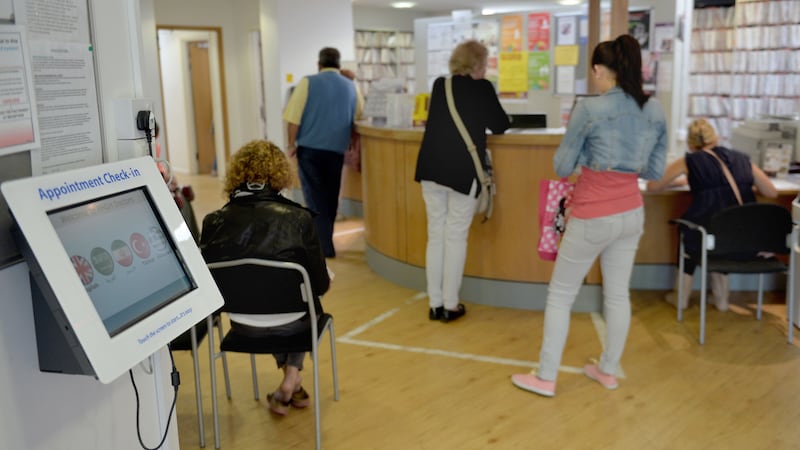GP practices in Northern Ireland are receiving more money to meet their insurance costs after negotiations with the Department of Health.
The cost of indemnity, which protects GPs against issues like medical malpractice claims, has been a key area of concern.
Unlike other UK regions, GPs working at surgeries in Northern Ireland don’t have a state-backed indemnity scheme – costing around £10,000 a year for a full-time GP.
£5m will now be put towards these costs for this financial year, working out at nearly £16,000 more for an average sized GP surgery.
- Northern Ireland GPs ‘struggling to the point of collapse’ with calls for urgent action to stabilise systemOpens in new window
- Moving Health Minister Robin Swann wasn’t being contemplated, Covid inquiry toldOpens in new window
- Children’s waiting times in Northern Ireland have become ‘out of control’ warn medicsOpens in new window
It was one of several key issues of concern highlighted in a scathing report last month from the Royal College of GPs Northern Ireland, which said workforce and funding pressures meant GPs were “struggling to the point of collapse.”
Health Minister Robin Swann has now called changes to the General Medical Services (GMS) contract for 2024/25 an important step towards stabilising GP services.
As well as dedicated funding towards indemnity costs, the changes are to allow GPs greater certainty on their practice income over the year and to reduce administrative burdens.

“Whilst the budget provided to me by the Executive does not allow me to make a substantial increase in the overall value of the contract, I am pleased that the agreement announced today makes significant progress against key aims identified by GPs in their negotiations, including provision of dedicated funding for their indemnity costs,” he said.
“I would pay tribute to the constructive and imaginative approach taken by NIGPC leadership throughout these negotiations.”
Dr Alan Stout is the lead negotiator for the British Medical Association’s Northern Ireland GP Committee.
“When we entered negotiations we were clear that we had three aims; to simplify the contract, to ensure a fair uplift and to make significant progress on indemnity,” he said.
“We have managed to negotiate successfully in these key areas for this year, and we secured a commitment from the Department and SPPG (Strategic Planning and Performance Group) to further review the contract for subsequent years.”

Calling the issue of indemnity for GPs in Northern Ireland “a red line” for negotiators, he said it would be proportionately shared out and paid upfront to help with cashflow.
“We will continue to work with the Department to bring forward a longer-term indemnity solution that ensures we have parity with the rest of the UK,” he said.
Simplifying the current arrangements for GPs, he said several other areas had been moved into core funding including the monitoring of amber drugs, alcohol, clinical waste and chronic respiratory funding.
“I am pleased that practices will now see the bulk of their funding paid in 12 monthly instalments to help with cashflow and budget planning. We were also able to ensure that no practice will lose any of their current income as there will be a financial floor for everyone.”
He said that a new Northern Ireland Assurance Framework was being finalised, bringing all regulatory, legal and statutory requirements into one place.
“We have worked hard to make sure that this is a ‘light touch’ assurance framework, not more work for GPs and their teams to complete.
“Negotiating these changes has been challenging. We have not achieved everything we know needs to be done and we will continue to work on a new fit for purpose GMS for 2025 onwards. "
While further progress was needed to meet the growing demands of primary care, Dr Stout said it was clear this depended on the health budget.
Mr Swann has rejected the latest Stormont budget, stating he still has £300m less than required to maintain services at their current level.
At last week’s Stormont Health Committee, however, MLAs called on Mr Swann to produce more detailed plans about how any extra money would be spent.
BMA Northern Ireland GP committee has agreed changes to the general medical services (GMS) contract as part of their campaign to stabilise and sustain primary care services in Northern Ireland @alanstout19 explains the change. pic.twitter.com/7GQMF4onsz
— BMANI-GP (@BMANI_GP) May 7, 2024
Speaking on the BBC Nolan show on Tuesday, Dr Stout added that the latest changes were an important step towards attracting more staff and gradually making it easier for patients to get appointments.
The frequent complaint from patients is struggling to get through on the phones, often being told all the daily appointments have been filled and they must try again in the morning.
Dr Stout was asked why more GP practices can’t switch to an electronic booking system, allowing them to schedule appointments in advance.
“That’s just simply a capacity issue, we had a number of practices that have actually moved to that appointment system,” he said.
“All they’ve done is generate a different complaint, that all patients that ring up are told it will be eight/nine weeks before they get another appointment.
“If you don’t have capacity in that system, you’re never going to meet demand.”







